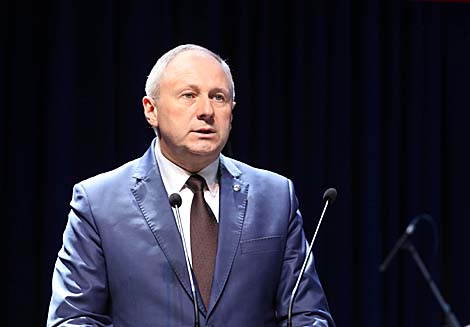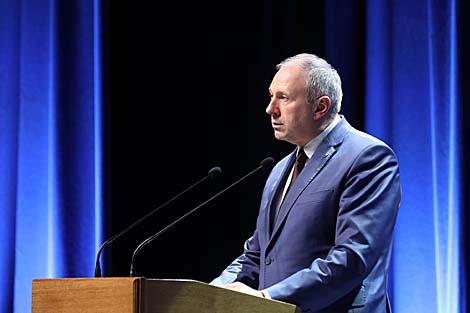Opinions & Interviews
PM: The tragedy of the past may lay foundation for partnership towards common future

MINSK, 29 March (BelTA) – The Array of Names monument to the Austrian victims of Nazism in the Trostenets Memorial has become a site showing how the tragedy of the past may lay foundation for the partnership and cooperation of present generations to develop a common future, Belarus’ Prime Minister Sergei Rumas said as he attended the Memory Evening event at the Palace of the Republic on 28 March to honor the memory of the victims of Nazism. The event was held as part of Austrian Federal Chancellor Sebastian Kurz’s visit to Minsk, BelTA has learned.
“Today, the Belarusian land has received another mourning and tragic monument to the victims of World War II, the Austrian Jews killed in the Trostenets death camp,” said Sergei Rumas.
“More than ten years ago, during the commemorative events dedicated to the tragedy of the Minsk ghetto, the Belarusian president announced the construction of a memorial in Trostenets, where dozens and hundreds of thousands of Jews, Belarusians and other nationalities, who refused to kneel before the inhuman Nazi regime, were brutally killed,” the prime minister said.
In his words, a lot has been done over the years, including the construction of the Gate of Memory and a memorial, the organization of exhibitions and scientific conferences in Belarus and abroad. Alongside with representatives of Belarus, scientists and researchers, architects, members of public associations, government bodies and local authorities, working on the development of the memorial and the reconstruction of the history of the death camp and the fates of its victims were also partners from European countries, primarily from Austria and Germany.
“The opening of the Austrian monument, The Array of Names, in Trostenets is a vivid example of how the territory of death and non-existence can become through our joint efforts a territory of memory and a reminder of how the partnership and cooperation of modern generations aimed at developing a common future may grow from the tragedy of the past,” Sergei Rumas said. He expressed confidence that the successful experience of cooperation between the Belarusian and Austrian experts will serve further rapprochement of the two countries, the strengthening of trust and mutual understanding.
 “The Belarusian government is grateful to all partners for cooperation which made the memorial in Trostenets an object of common European memory, the memorial which reveals the anti-human essence of the Nazi ideology towards the peaceful population of Europe,” the Belarusian head of government stressed.
“The Belarusian government is grateful to all partners for cooperation which made the memorial in Trostenets an object of common European memory, the memorial which reveals the anti-human essence of the Nazi ideology towards the peaceful population of Europe,” the Belarusian head of government stressed.
He recalled that during the years of occupation Belarus went through all the horrors of the Nazi genocide. More than 260 death camps, hundreds of Jewish ghettos were set up in Belarus. The Nazis destroyed more than 200 cities and 9,000 villages. Khatyn, the village which was burned together with its people, became a symbol of the brutal massacre of civilians, and its fate was shared by hundreds of other Belarusian villages. At the same time, Belarus is well-known for its unprecedented and mass resistance during the war. More than 370,000 people, including representatives of various nationalities of the Soviet Union and anti-fascists of European countries, took part in the nationwide partisan movement. The activities of the Jewish partisan units became a heroic page of history. The feat was also accomplished by thousands of Belarusians who saved the Jews by risking their own lives.
The Nazi genocide manifested itself in mass executions, killings in gas chambers, inhuman forced labor which led to death. “We must not forget that the origins of this genocide lie in human cruelty and intolerance, which became the basis of the theory of racial superiority. We must remember those who died, and also do everything necessary for the new generation to know about the past and understand why this happened,” Sergei Rumas emphasized.
The Belarusian prime minister believes it is important to foster in the youth a categorical rejection of any manifestations of racial or national superiority and to do everything possible to prevent the repetition of such a catastrophe.
The premier assured that Belarus will always be in solidarity with other states and international public organizations in perpetuating the memory of the victims of that war and the deeds of all those who fought, and will not allow the glorification of Nazism and will make every effort to develop a tolerant society.







 print version
print version make home page
make home page add to bookmarks
add to bookmarks

